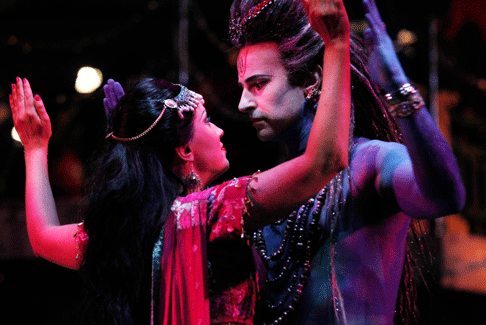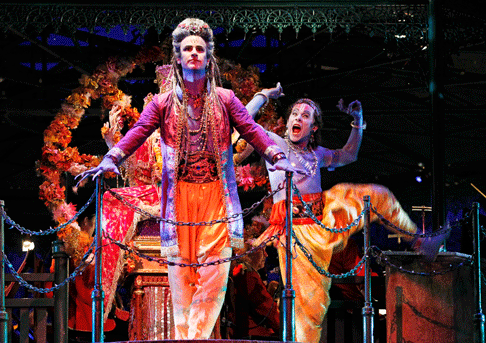06 Dec 2010
A Midsummer Night’s Dream, Opera Australia
Transplanting Britten’s Shakespeare opera to an Indian setting seems at first an illogical step by Hollywood director Baz Luhrmann.

Transplanting Britten’s Shakespeare opera to an Indian setting seems at first an illogical step by Hollywood director Baz Luhrmann.
But the result made for a popular production. Dating from 1993 Luhrmann directed this long before his rise to fame but his flair for exotica and rich visuals was apparent even then. Luhrmann’s relocating of the story from ancient Athens to 1920s India cashed-in on the trend at the time for Bollywood movies and Indian inspired fashion and décor.
The world of Indian mysticism does, however, seem more suited to the mysterious world Britten creates in his score. These spirit beings are to be feared and to enter their realm should therefore be far more disturbing. Ravel did the same in L’Enfant et les Sortileges, his enchanted garden is an alluring but fearful place. So is Britten’s forest.
Having the fairies as Indian gods and the mortals as British Raj may confuse the text and storyline and Luhrmann’s tendency to keep the action busy often spoils the nocturnal, dreaminess of some of the music. An English bandstand set in a park somewhere in India in 1923 dominates the set. The roof becomes a platform where Oberon oversees his magical ministrations while on stage level there is a pond below the bandstand where fairies and mortals meet. The orchestra have been relocated from the pit to the middle level and, dressed in military band uniform, are constantly in view as are the subtleties and inventiveness of Britten’s score.
The loveliest of the opera’s scenes, where Tytania awakens to the transformed Bottom is beautifully done here. Lorina Gore’s increasing ecstatic and extravagant vocal lines float around Conal Coad’s trombone accompanied bellowing and braying as Bottom.
With his genial, rollicking bass, Coad leads the mechanicals in their three scenes with great success. In the guise of an army entertainment troop, the effect is straight out of an English Music Hall parody of Italian opera along the lines that Britten and librettist Peter Pears intended.
The quartet of lovers is superb. Henry Choo’s ardent and honey-voiced Lysander sounds very much in the British tenor tradition. Choo’s first scene with Hermia is beautifully sung. Even more so as he sang the repeated “I swear to thee” phrases running up and down a staircase! Lisa Harper-Brown’s plaintive soprano beautifully contrasts with Dominica Matthews’s mezzo in the famous squabble that, here, becomes a cat-fight ending with both splashing about in the pool. The physical prowess of Opera Australia’s singers often matches their vocal prowess.
The most physical performance of all is Tyler Coppin’s as Puck. Nobody seems to cast a boy in this part anymore as using an adult actor gives greater opportunity to create a character. With his small stature Coppin has the best of both worlds however, looking like an adult trapped in boy’s body. His slapstick performance contrasts nicely with Tobias Cole’s stealthy, almost sinister Oberon. Perched above the stage with waist length dreadlocks, white face, blue, clawed hands and backed by Britten’s melismatic music Cole’s performance reinforces this role as still one of the best in modern operatic literature for a counter-tenor.
 Tobias Cole as Oberon and Lorina Gore as Tytania
Tobias Cole as Oberon and Lorina Gore as Tytania
In a sound-world all of its own, Oberon’s music benefited from Cole’s restrained performance. With their prominence on the stage Orchestra Victoria, lead by Britten authority Paul Kildea, were able to make every nuance of the fairies' scenes as well as the deliberately lumpen scenes for the rustics and their play.
This Midsummer Night’s Dream was a run-away success when first staged and, unlike any other production of a Britten opera, played to full houses. The production was so popular it was presented at the 1994 Edinburgh Festival. The sheer vitality of the playing, singing and production in this revival make any qualms about the logic of the setting fall away thanks to the hallmark ensemble work of this company.
Michael Magnusson
 Tobias Cole as Oberon and Tyler Coppin as Puck
Tobias Cole as Oberon and Tyler Coppin as Puck